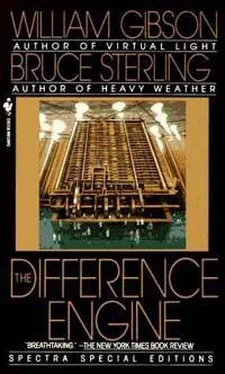William Gibson - The Difference Engine
Здесь есть возможность читать онлайн «William Gibson - The Difference Engine» весь текст электронной книги совершенно бесплатно (целиком полную версию без сокращений). В некоторых случаях можно слушать аудио, скачать через торрент в формате fb2 и присутствует краткое содержание. Жанр: sf_cyber_punk, fantasy_alt_hist, на английском языке. Описание произведения, (предисловие) а так же отзывы посетителей доступны на портале библиотеки ЛибКат.
- Название:The Difference Engine
- Автор:
- Жанр:
- Год:неизвестен
- ISBN:нет данных
- Рейтинг книги:3 / 5. Голосов: 1
-
Избранное:Добавить в избранное
- Отзывы:
-
Ваша оценка:
- 60
- 1
- 2
- 3
- 4
- 5
The Difference Engine: краткое содержание, описание и аннотация
Предлагаем к чтению аннотацию, описание, краткое содержание или предисловие (зависит от того, что написал сам автор книги «The Difference Engine»). Если вы не нашли необходимую информацию о книге — напишите в комментариях, мы постараемся отыскать её.
The Difference Engine — читать онлайн бесплатно полную книгу (весь текст) целиком
Ниже представлен текст книги, разбитый по страницам. Система сохранения места последней прочитанной страницы, позволяет с удобством читать онлайн бесплатно книгу «The Difference Engine», без необходимости каждый раз заново искать на чём Вы остановились. Поставьте закладку, и сможете в любой момент перейти на страницу, на которой закончили чтение.
Интервал:
Закладка:
The paper-stock, of modest quality and badly yellowed by age, is of a sort in common governmental use in the mid-1850s. Its probable origin is the Kings Road West police station.
The text, in a badly faded ink from a pen-nib worn by long use, reads as follows:
MADAME.
I have told no one. But someone must be told. I conclude that you must be my confidante, for there is no one else.
When I took your property into my safe-keeping, I did so freely. Your request is one I honor as I would a royal command, and your enemies are, of course, my own. It is the highest privilege of my life to act as your paladin.
Pray do not be alarmed for my safety. I beg you, take no steps on my behalf that might endanger yourself. Any risk in this battle I assume gladly, but there is indeed risk. Should the worst befall me, it is likely that your property would never be recovered.
I have examined the cards. I believe I have some inkling of their use, though they are far beyond my meager skill in Enginery. If this was an impertinence, I beg your pardon.
I have bound the cards securely in wrappings of clean linen, and personally sealed them away within an airtight container of plaster. That container is the skull of the Brontosaurus specimen in the Museum of Practical Geology in Jermyn Street. Your property now reposes in perfect safety some thirty feet above the ground. No human soul knows this, excepting yourself, and
Your Ladyship's most humble servant,
EDWARD MALLORY, F.R.S., F.R.G.S.FOURTH ITERATION
Seven Curses
This object is a patriotic funerary plaque in dense white porcelain, of the sort produced to commemorate the deaths of royalty and heads of state. Beneath an originally colorless glaze, cracked and yellowed by processes of time, are visible the features of Lord Byron.
Tens of thousands of these objects were sold throughout England during the months following the Prime Minister's death. The plaques themselves were of a standard manufacture, held in readiness for the demise of any sufficiently noted personage. The image of Byron, surrounded by wreaths, ornate scroll-work, and figures representative of the early history of the Industrial Radical Party, has been Engine-stippled upon a film of transparent material, which was then transferred to the plaque, glazed, and fired.
To Byron's left, amid stippled scroll-work, a crowned British lion poses rampant above the blurred coils of a defeated serpent, most probably meant to represent the Luddite cause.
It was sometimes remarked upon, both during and after Byron's rise to leadership, that his maiden speech in the House of Lords, February, 1812, urged clemency for the Luddites. Byron himself, questioned in this regard, is widely believed to have replied, "But there were Luddites, sir, and then there were Luddites." While this remark may be apocryphal, it is wholly in keeping with what is known of the Prime Minister's personality, and would seem to refer to the extraordinary severity with which he later put down and suppressed the popular Manchester-based anti-industrial movement led by Walter Gerard. For this was a form of Luddism attacking, not the old order, but the order that the Rads themselves had established.
This object was once the property of Inspector Ebenezer Fraser, of the Bow Street Special Branch.
Mallory had stayed with Fraser, watching the police surgeon at work with dirty sponge and bandage, until he was sure that Fraser was fully distracted. To further ease Fraser's evident suspicions, Mallory had borrowed a sheet of police stationery and set to the task of composing a letter.
In the meantime, the Kings Road station had slowly filled with bellowing ruffian drunks and various species of rioter. It was very interesting as a social phenomenon, but Mallory was in no mood to spend the night on a cheerless cot in some raucous cell. His taste was most stubbornly set on something else entirely.
So he had politely asked directions of a harried and exhausted sergeant, noted them with care in his field-book, and eased out of the station. He'd had no problem finding Cremorne Gardens.
The situation there was nicely indicative of the city's crisis dynamic. It was quite calm. No one in the Gardens seemed aware of events beyond, the shock-waves of localized dissolution having not yet permeated the system.
And it did not stink so badly here. The Gardens were on the Chelsea Reach, well upstream of the worst of the Thames. There was a faint night-breeze off the river, somewhat fishy but not altogether unpleasant, and the fog was broken by the great leafy boughs of Cremorne's ancient elms. The sun had set, and a thousand cloudy gas-lights twinkled for the pleasure of the public.
Mallory could imagine the pastoral charm of the Gardens in happier times. The place had bright geranium-beds, plots of well-rolled lawn, pleasant vine-enshrouded kiosks, whimsical plaster follies, and of course the famous Crystal Circle. And the "monster platform" as well, a great roofed and wall-less ballroom, where thousands might have strolled or waltzed or polkaed on the shoe-streaked wooden deck. There were liquor-stands inside, and food, and a great horse-cranked panmelodium playing a medley of selections from favorite operas.
There were not, however, thousands present tonight. Perhaps three hundred people circulated listlessly, and no more than a hundred of these were respectable. This hundred were weary of confinement, Mallory assumed, or courting couples braving all unpleasantness to meet. Of the remainder, two-thirds were men, more or less desperate, and prostitutes, more or less brazen.
Mallory had two more whiskeys at the platform's bar. The whiskey was cheap and smelled peculiar, either tainted by the Stink or doctored with hartshorn or potash or quassia. Or perhaps indian-berry, for the stuff had the color of bad stout. The whiskey-shots sat in his stomach like a pair of hot coals.
There was only a bit of dancing going on, a few couples attempting a self-conscious waltz. Mallory was not much of a dancer at the best of times. He watched the women. A tall, finely shaped young woman danced with an older, bearded gentleman. The fellow was stout and looked gouty in his knees, but the woman stood tall as a dart and danced with as much grace as a professional, the brass heels of her dolly-boots glinting in the light. The sway of her petticoats suggested the shape and size of the haunches beneath. No padding or whalebone was there. She'd fine ankles in red stockings and her skirts were two inches higher than propriety allowed.
He could not see her face.
The panmelodium struck up another tune, but the stout gentleman seemed winded. The pair of them stopped and moved off among a group of friends: an older, modest-looking woman in a bonnet, two other young girls who looked like dollymops, and another older gentleman who looked bleak-faced and foreign, from Holland perhaps or one of the Germanies. The dancing girl was talking with the others and tossing her head as if laughing. She had fine brunette hair and a bonnet knotted round her throat and hanging down her back. A fine, solid, womanly back and slim waist.
Mallory began walking slowly toward them. The girl talked with seeming earnestness to the foreign man, but his face showed reluctance and a seeming disdain. The girl sketched out something like a half-reluctant curtsey, then turned away from him.
Mallory saw her face for the first time. She had a strange long jaw, thick eyebrows, and a broad mobile slash of a mouth, lips edged with rouge. It was not exactly an ugly face, but decidedly plain. Yet there was a sharp, reckless look in her grey eyes and a strangely voluptuous expression that caught him as he stood. And she had a splendid form. He could see it as she walked—rolled, slid almost—to the bar. Again those marvelous hips and the line of that back. She leaned across the bar to chaff with the barman and her skirt rose behind her almost to her red-stockinged calf. The sight of her muscular leg thrilled him with a jolt of lewd intensity. It was as if she had kicked him with it.
Читать дальшеИнтервал:
Закладка:
Похожие книги на «The Difference Engine»
Представляем Вашему вниманию похожие книги на «The Difference Engine» списком для выбора. Мы отобрали схожую по названию и смыслу литературу в надежде предоставить читателям больше вариантов отыскать новые, интересные, ещё непрочитанные произведения.
Обсуждение, отзывы о книге «The Difference Engine» и просто собственные мнения читателей. Оставьте ваши комментарии, напишите, что Вы думаете о произведении, его смысле или главных героях. Укажите что конкретно понравилось, а что нет, и почему Вы так считаете.









